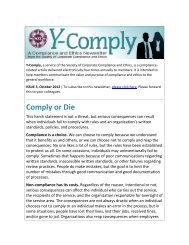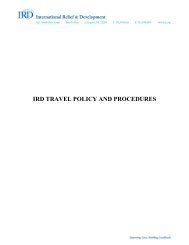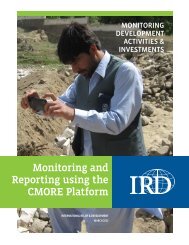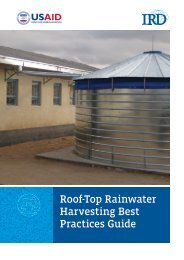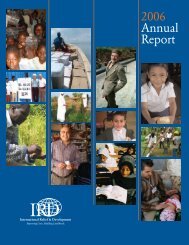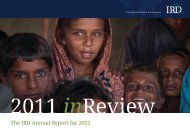Empowering citizens Engaging governments Rebuilding communities
Empowering citizens Engaging governments Rebuilding communities
Empowering citizens Engaging governments Rebuilding communities
Create successful ePaper yourself
Turn your PDF publications into a flip-book with our unique Google optimized e-Paper software.
Regarded as Iraq’s preeminent facility for<br />
the treatment of communicable diseases,<br />
the Ibn Zuhr Hospital was the country’s only<br />
hospital with specialized equipment and staff<br />
trained to treat patients with HIV or AIDS<br />
mobilizer, the group set about identifying and ranking<br />
needs to develop program proposals. They then<br />
worked with IRD to put together a realistic implementation<br />
plan for projects that the group could organize<br />
and fund through their own resources. The projects<br />
ranged from small neighborhood cleanups to work on<br />
a much larger scale, like the restoration of facilities<br />
at their renowned but war-damaged neighborhood<br />
hospital.<br />
Regarded as Iraq’s preeminent facility for the treatment<br />
of communicable diseases, the Ibn Zuhr Hospital<br />
was the country’s only hospital with specialized<br />
equipment and staff trained to treat patients with HIV<br />
or AIDS. During 2003, looters stole vital equipment,<br />
supplies, and drugs. They also started fires, smashed<br />
windows, and damaged equipment. After the looting,<br />
some hospital staff set out on their own to restore the<br />
facility’s capabilities by scrounging medical equipment<br />
from other Baghdad locations and, in some<br />
cases, purchasing supplies with their own money.<br />
The destruction of the hospital was a bitter blow to<br />
the community’s residents, who not only viewed the<br />
hospital’s work as a source of pride but also relied on<br />
the facility to provide emergency room services and<br />
primary healthcare. The Ibn Zuhr community group<br />
designated the restoration of the hospital, a vital<br />
piece of the community’s infrastructure, as its top<br />
priority.<br />
Group members met with hospital staff to determine<br />
the most urgent needs and worked with mobilizers to<br />
develop a proposal. ICAP provided the hospital with<br />
much needed equipment, such as diagnostic tools<br />
and machinery for sterilizing medical instruments. For<br />
the community contribution, the Ministry of Health<br />
provided the hospital with additional equipment and<br />
office furniture. At the same time, group members<br />
developed their own project to dovetail with the<br />
ICAP-backed project. Canvassing the neighborhood,<br />
members raised donations and signed volunteers to<br />
repaint rooms and make basic carpentry repairs. Using<br />
equipment donated from local businesses, volunteer<br />
electricians repaired the hospital’s damaged electrical<br />
system, not only restoring its functionality but also<br />
bringing the wiring up to international standards.<br />
The enterprising Ibn Zuhr community group, continuing<br />
its independent work, soon created its own NGO<br />
to provide assistance to the disabled. Relying solely<br />
on community donations, the newly formed NGO<br />
began providing clothing, wheelchairs, and medical<br />
care to hundreds of disabled children living in the<br />
Mada’en district. Members contacted IRD for ongoing<br />
guidance on projects and fundraising strategies,<br />
while mobilizers continued to provide capacity development<br />
support. “Those residents didn’t wait for<br />
someone from outside their community to tell them<br />
what they needed or how to proceed,” said Ernest<br />
Leonardo, the chief of party for ICAP. “They took the<br />
initiative to organize themselves and to get to work.<br />
This kind of grassroots activism is at the heart of<br />
civil society.”<br />
The Ibn Zuhr community group exemplified the positive<br />
outcomes that a program like ICAP, intended to<br />
reengage <strong>citizens</strong> through stronger civil society, can<br />
achieve. Just as impressive was the commitment<br />
of the Ibn Zuhr group to restoring order even as the<br />
larger societal fabric in the Mada’en district began<br />
to unravel. On April 20, 2005, less than a year after<br />
the formation of the Ibn Zuhr action group, 57 bodies<br />
were fished from the Tigris River downstream of<br />
Mada’en; residents said that hundreds more were in<br />
the water. Days before that discovery, insurgents had<br />
taken control of Mada’en district streets, and the local<br />
government reported 150 Shia men and women had<br />
been kidnapped. 6 The evidence pointed to a systematic<br />
killing believed to have taken place over several<br />
months, during the same time that Ibn Zuhr residents<br />
and IRD staff had been taking steps to rebuild the<br />
area’s civic pride and functionality.<br />
1<br />
Building community trust<br />
17


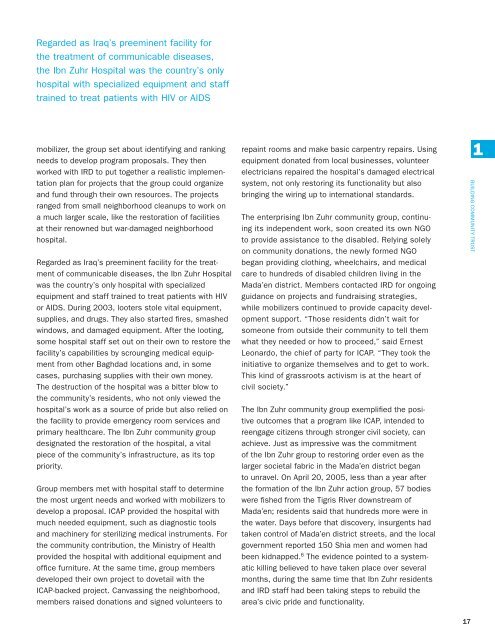
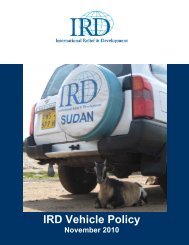
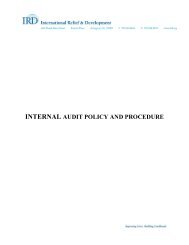
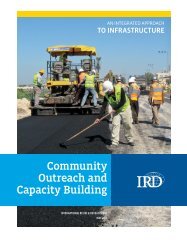
![Guide bonne pratique production d'oignon qualité_VF_4_2411012[1]](https://img.yumpu.com/23506639/1/184x260/guide-bonne-pratique-production-doignon-qualitac-vf-4-24110121.jpg?quality=85)

